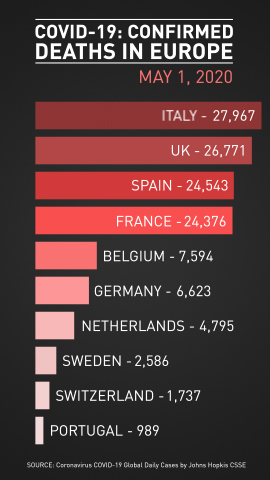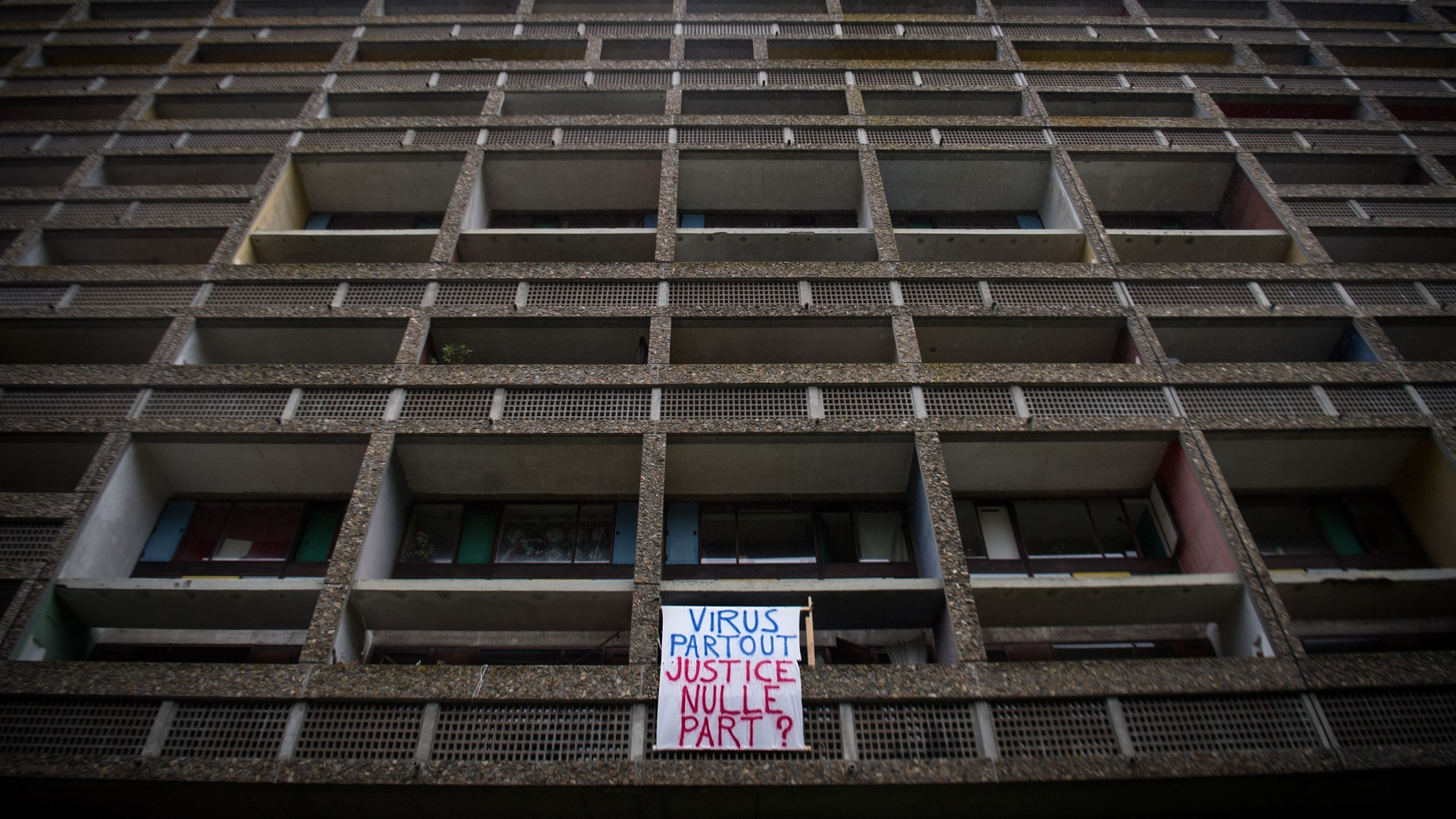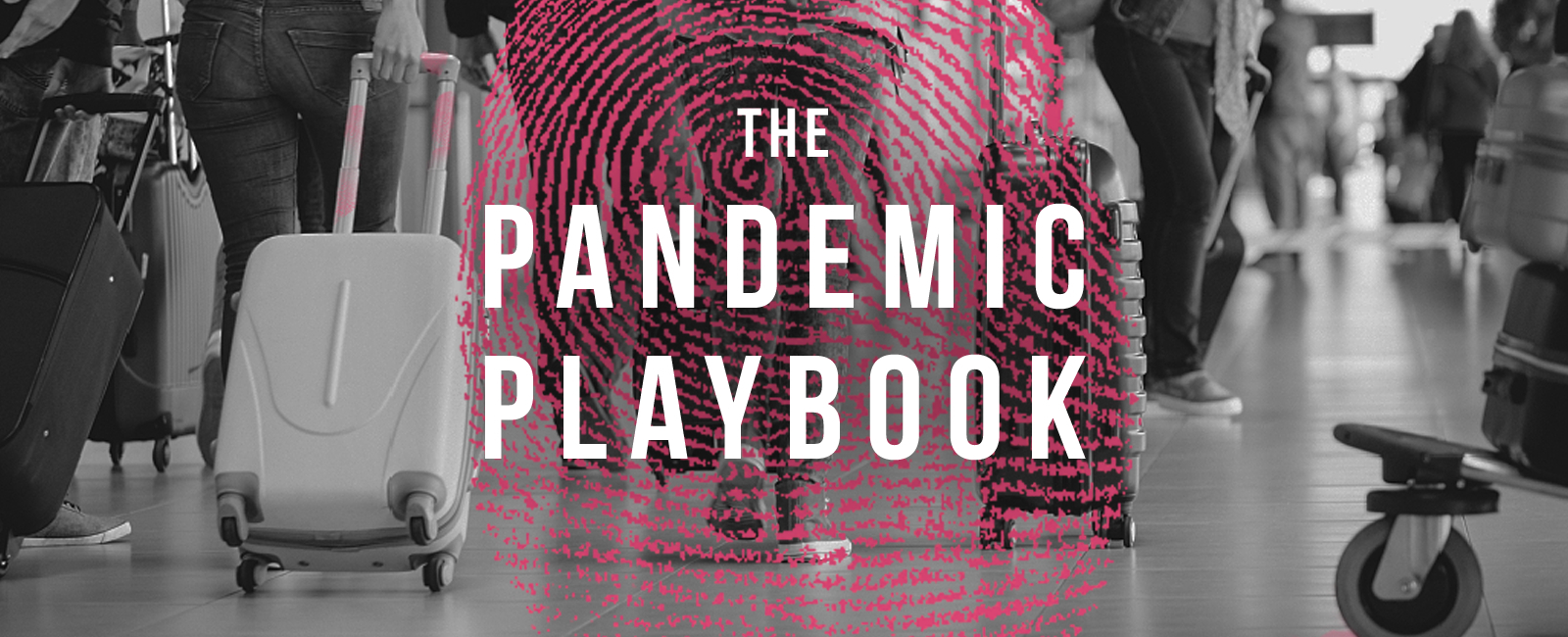MAIN HEADLINES:
– Russia has reported 7,933 new cases, its record daily rise , bringing the total to 114,431. It reported 96 more deaths, pushing the toll to 1,169.
– Russia's prime minister, Mikhail Mishustin, has tested positive and is temporarily stepping down to recover.
– Portugal announced a three-phase plan to lift lockdown measures , starting on Monday with small neighborhood shops. Portugal has suffered 989 deaths.
– France announced its lowest weekday death-toll increase since March. The rise of 289 takes the total to 24,376.
– The Czech government has brought forward the easing of restrictions , allowing the resumption of cultural and sporting events with up to 100 people. Cinemas, theaters, shopping malls and religious services will reopen from 11 May after the number of new cases dropped below 100 for the past eight consecutive days.
– British Airways has told staff it **may not restart its services from London Gatwick Airport **after the pandemic. Meanwhile, London Heathrow, Europe's busiest airport, expects passenger numbers to have fallen by around 97 percent in April.
– Hungary's prime minister, Viktor Orban, says the country must prepare for a second wave of the virus in October/November .
– French far-right leader **Marine Le Pen defied the Paris lockdown **to maintain her party's annual tradition of honoring medieval heroine Joan of Arc by placing a wreath at her statue on 1 May.
– In the UK, people from some ethnic minorities are dying in disproportionate numbers from COVID-19 , according to a think tank. Death rates for British people with black Caribbean heritage are three times higher than for white British citizens.
–Bosnia's coronavirus-free Adriatic resort Neum is charging an entrance fee for the disinfection of vehicles, with the country's Labor Day holiday weekend starting today.
– British takeaway baker Greggs has backtracked from reopening 20 shops next week after "significant interest" caused worries that "excessive numbers of customers may plan to visit" the stores.
00:10

FROM OUR EUROPEAN CORRESPONDENTS:
Guy Henderson in Berlin
Germany's infection rate has dropped significantly since reaching its target limit earlier this week, according to the Robert Koch institute. That will continue to put a sense of ease in the air as streets gradually refill and a further easing of lockdown measures is announced.
Smaller shops reopened this week and we already know some students will return to class next Monday. Now the government says religious gatherings will be permitted and that museums, zoos, and playgrounds will also reopen. Dates may vary from state to state – with regional variations to the rate of infection.
Further discussions will take place on 6May, when restaurants and cafes will be on the agenda, as well as kindergartens, which are now only open for emergency care. Social-distancing measures and a ban on public gatherings of more than two people – excluding families and households – remain in place.
It is May Day today – traditionally a time to celebrate summer and in some places take to the streets in protest. Will people stick to the rules as the mood lightens?
Isobel Ewing in Budapest
Hungary's prime minister Viktor Orban says the COVID-19 virus may slow down over summer, but a second wave is possible in October/November.
Orban says the number of new infections is slowing down, partly due to the warmer weather and also the success of Hungary's defence measures, but warned the fight isn't yet over: "There is debate as to whether the second wave will be smaller or stronger than the current one," he said. "No one knows that."
Festival-goers around the world were crestfallen to learn Budapest's famous Sziget, a large music festival held on an island in the Danube that attracts big-name acts and was set to be held on 5-11 August, has been cancelled.
It comes after the government revealed events of 500 people or more will be banned until 15 August. The government also said schools will not go reopen before the end of May and the decision will be reviewed then.
Andrew Wilson in London
Figures today will reveal if the UK government has met its own challenge to reach 100,000 tests by the end of April. More than 80,000 were logged on Wednesday.
A survey has shown that more than 60 percent of people would be reluctant to use public transport or visit bars and restaurants if the lockdown were to be lifted.
Prime Minister Boris Johnson has declared Britain is over the peak of infection but said the country must wait until next week for more details on what the government intends to do about the lockdown.
Johnson has declared the reinfection rate as a crucial benchmark for progress, saying it should be kept below 1 and currently stands at about 0.7, down from nearly 4 in early March.
Sports authorities are considering plans to play all next season's football matches behind closed doors, possibly until May next year. The government is expected to link all mass gatherings to widespread deployment of an effective vaccine that would also affect other sports, music festivals and concerts.

On Labor Day 2020, a banner reading "Virus everywhere, Justice nowhere?" hangs from a balcony of the Cite Radieuse building, outside Nantes, France. /Loic Venance/AFP
FROM OUR GLOBAL COLLEAGUES:
CGTN China:
What’s behind China’s low COVID-19 death rate?
CGTN America:
Fighting COVID-19 on Chicago’s South Side
CGTN Africa:
Rwanda to relax travel ban as economy struggles under COVID-19

MORE FROM CGTN:
**Check out **
The Pandemic Playbook
, CGTN Europe's major investigation into the lessons learnt from COVID-19
**Sign up **
here
** to get the COVID-19 Europe bulletin sent directly to your inbox**
Source(s): Reuters
 简体中文
简体中文

